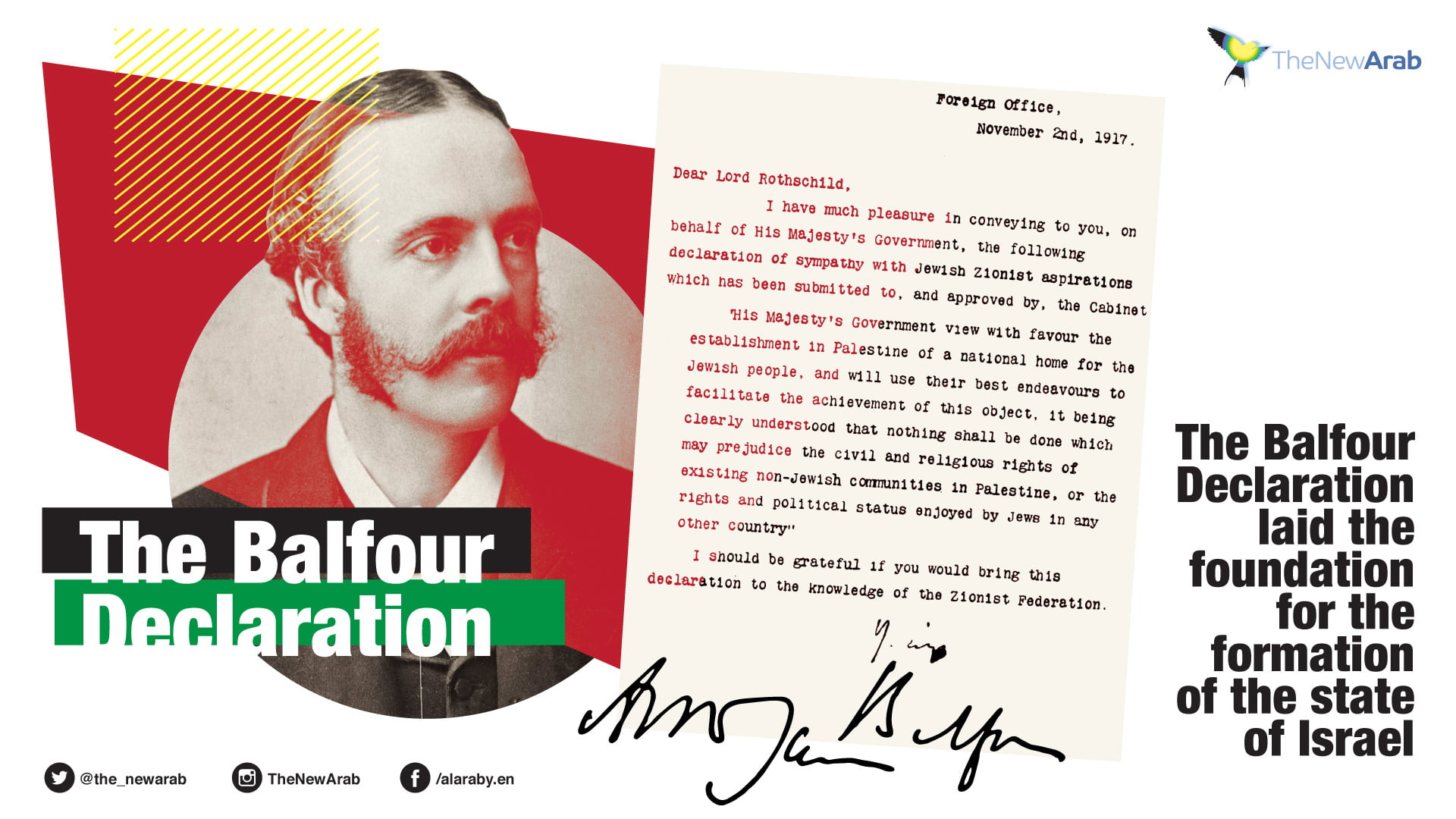The Balfour Declaration is a critical document in the history of the Middle East, Israel, and the Palestinian people. Issued on November 2, 1917, this brief letter signified British support for the establishment of a “national home for the Jewish people” in Palestine and just so happened to be sent to the Zionist Lord Rothschild.
However, this document and its aftermath are steeped in controversy. Let’s delve into the details surrounding the Balfour Declaration, its repercussions, and the debate surrounding its interpretation and implementation.

The Balfour Declaration: Context and Content
The Balfour Declaration was a result of various political and historical developments. In the context of World War I, the British wanted to garner the support of the global Jewish community, particularly in Russia and the US, to exert pressure on their governments to either stay in or join the war effort against the Central Powers. Furthermore, the British were also interested in gaining control over Palestine due to its strategic location.
The declaration, addressed to Lord Rothschild, a leading British Jew, read:
“His Majesty’s government view with favour the establishment in Palestine of a national home for the Jewish people, and will use their best endeavours to facilitate the achievement of this object, it being clearly understood that nothing shall be done which may prejudice the civil and religious rights of existing non-Jewish communities in Palestine, or the rights and political status enjoyed by Jews in any other country.”
This wording was intentionally ambiguous. While it expressed support for a Jewish national home, it did not define the parameters of this home or the means by which it would be established.
The Aftermath and the Mandate
Following the end of WWI, the League of Nations granted Britain a mandate to govern Palestine. The British now had to manage the conflicting nationalistic aspirations of both Arabs and Jews in the region. They issued a series of White Papers, or policy statements, aimed at clarifying their stance on the issue, but tensions only escalated.
By the 1930s and 1940s, Jewish immigration to Palestine increased significantly, spurred by anti-Semitic policies and persecution in Europe. This increased Jewish presence, coupled with land purchases that sometimes displaced Arab tenants, led to heightened tensions and violent confrontations.
The “Contract” and Allegations of Zionist Breaches
Many Palestinians saw the Balfour Declaration’s wording as a promise to protect their rights. Thus, they felt that the mass immigration of Jews and the establishment of a Jewish-majority state was a betrayal of this promise. From this perspective, some argue that the Zionists “broke the contract”.
It is essential, however, to approach the term “contract” with caution. The Balfour Declaration was not a legally binding treaty but rather a statement of intent. Nevertheless, it’s undeniable that many Palestinians were displaced during and after Israel’s War of Independence in 1948.
This event, referred to as the Nakba (or “catastrophe”) by Palestinians, led to the displacement of an estimated 700,000 Palestinians.
Zionists as “Terrorists”?
The label of “terrorist” is contentious and politically loaded. It’s undeniable that certain Jewish paramilitary groups, like the Irgun and the Stern Gang, used violent and sometimes indiscriminate tactics against both British officials and Arab civilians in the pre-state period.
Such actions were controversial even within the Zionist movement. However, broadly painting the entire Zionist movement or the subsequent State of Israel as “terrorist” oversimplifies a complex historical narrative.
Irgun (Etzel)
The Irgun, or Etzel, was a Zionist paramilitary group that operated in the British Mandate of Palestine from 1931 to 1948. It was formed as a breakaway faction from the main Jewish defense organization, Haganah, due to ideological differences over how to respond to Arab attacks and British policies.
- King David Hotel Bombing (1946): One of the most infamous actions undertaken by the Irgun was the bombing of the King David Hotel in Jerusalem, which housed the British administrative headquarters. The attack resulted in the deaths of 91 people, including Jews, Arabs, and British personnel. The Irgun claimed that they had provided a warning to evacuate the building, but this remains a point of contention.
- Deir Yassin Massacre (1948): Another controversial event was the assault on the village of Deir Yassin, carried out jointly by the Irgun and another extremist group, Lehi. The attack resulted in the deaths of over 100 Arab villagers. The events of Deir Yassin have been heavily debated, but the massacre had a profound psychological impact on the Palestinian Arab population, contributing to a mass exodus from their homes during the war.
Lehi (Stern Gang)
Lehi, often referred to as the Stern Gang after its founder Avraham Stern, was another radical Zionist paramilitary group. They believed in the forceful establishment of a Jewish state on both sides of the Jordan River and were known for their uncompromising stance against the British and those they perceived as enemies of the Jewish state.
- Lord Moyne Assassination (1944): One of the high-profile actions carried out by Lehi was the assassination of Lord Moyne, the British Minister Resident in the Middle East. The group viewed him as an enemy of the Zionist cause.
- Count Bernadotte Assassination (1948): Lehi also orchestrated the assassination of Count Folke Bernadotte, a UN mediator, because they believed his proposals for the future of Palestine were detrimental to the Jewish state’s interests.
It’s worth noting that the mainstream Jewish leadership, including David Ben-Gurion, the first Prime Minister of Israel, often condemned the actions of these extremist groups. The newly established Israeli government even launched a military operation against the Irgun in 1948, known as the “Altalena Affair,” reflecting the deep divisions within the Jewish community over the use of violence and the vision for the new state.
When reflecting on the actions of these groups, it’s essential to remember the broader geopolitical context and the multitude of actors involved. While the violent acts of groups like the Irgun and Lehi were undeniable, labelling an entire national movement or subsequent state based on the actions of a fraction can be reductionist.
However, acknowledging and understanding these events is crucial for a comprehensive grasp of the region’s history.
Conclusion
The Balfour Declaration is undeniably a seminal document in the history of Israel and Palestine. Its ambiguous nature laid the foundation for decades of conflict and controversy.
While the pain and grievances of the Palestinian people must be recognized and addressed, it’s also crucial to approach the topic with nuance, avoiding over-generalizations and understanding the multifaceted nature of historical events.#
Source: https://expose-news.com
Disclaimer: We at Prepare for Change (PFC) bring you information that is not offered by the mainstream news, and therefore may seem controversial. The opinions, views, statements, and/or information we present are not necessarily promoted, endorsed, espoused, or agreed to by Prepare for Change, its leadership Council, members, those who work with PFC, or those who read its content. However, they are hopefully provocative. Please use discernment! Use logical thinking, your own intuition and your own connection with Source, Spirit and Natural Laws to help you determine what is true and what is not. By sharing information and seeding dialogue, it is our goal to raise consciousness and awareness of higher truths to free us from enslavement of the matrix in this material realm.
 EN
EN FR
FR



























The Zionists are the Khazarian Mafia or Deep State. They are Satanists. They orchestrated and funded both sides of the war with the intention of getting Palestine and kicking out the current owners. That's why they assassinated both the British AND the Arabs and anyone else who got in their way to creating Israel and taking over all the Palestinian land and resources.
Now in Dec 2023, they've fully achieved that. The last remaining Palestinians have been told to go to Egypt, Yemen, Jordan… anywhere, just not here.
It's likely if those countries do not accept them, that the People will simply be assassinated at the borders. This is the same group of Zionists that are fighting for their lives in Ukraine, using the Ukrainian people as canon fodder. The Zionists intend to take over Ukraine, once the war is over and all the locals are dead. There will be NO Ukrainians left, leaving a clear path for another Zionist Jewish State, right at the birth place of the Khazarian Mafia itself, originally Khazar.
Staunchone, your first paragraph "intention of getting Palestine & kicking out the current owners"
which were the Germans, who put in the original infrastructure & agriculture back in 1868.
An excellent book on how prominent Jews in USA (Brandeis and Frankfurter et al) worked behind the scenes to get US to enter the war is Alison Weir's Against Our Better Judgment. Jewish clubs across the country organized quietly. They sold Liberty bonds (and got a commission of course).
You can see the double-edged sword in this: a culture that has an identity thousands of years old, and clings to it, can be understood as working to bring about a country and homeland for themselves after centuries of wandering.
On the other hand, this dual-citizen think always makes them an untrustworthy 5th column whose loyalty is divided. Most immigrants to America left behind loyalty to their old country. As of course did many Jews who saw US as the Promised Land, and saw no need for a colonization of Palestine.
This play-acting of pretending to not understand why they are persecuted and not trusted must end.
Love your ending, so true. One must take a hard look at the "play-acting of pretending to be persecuted" of the Arab's, the so called Palestine's.